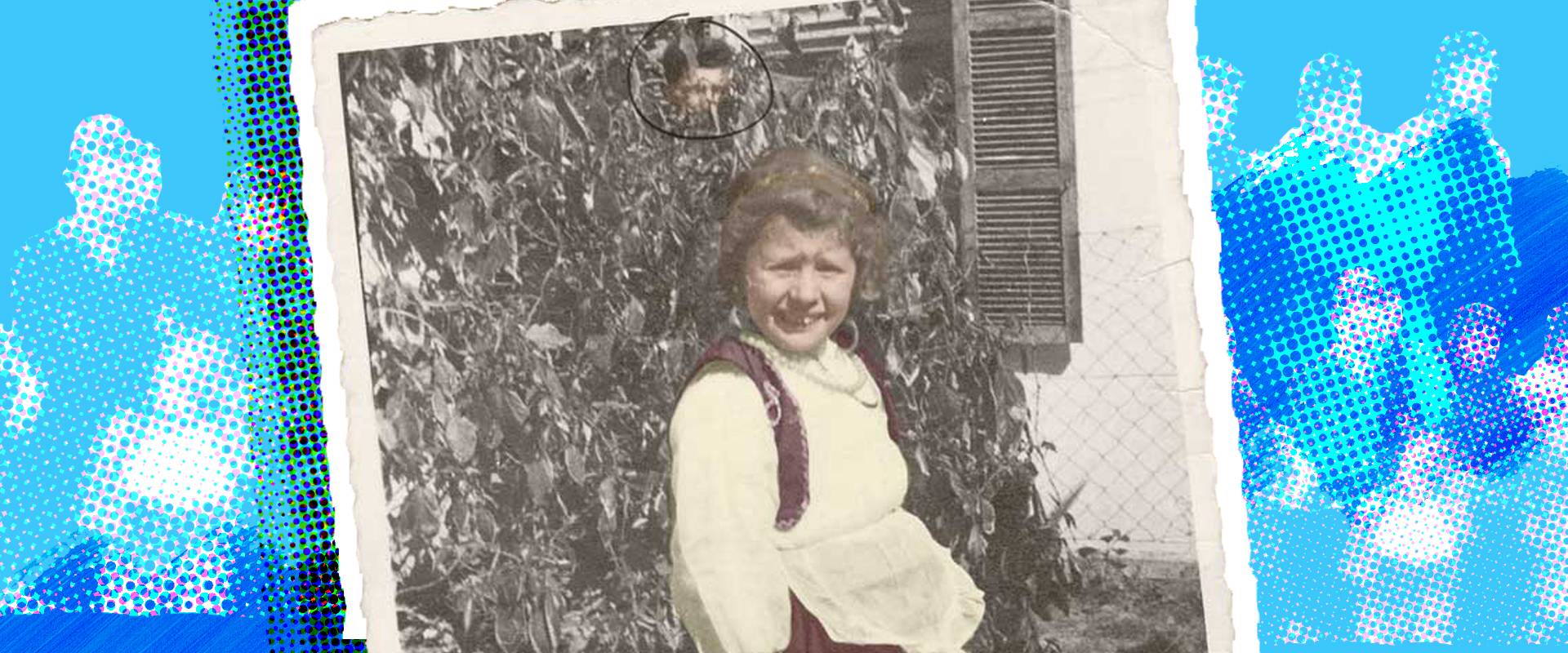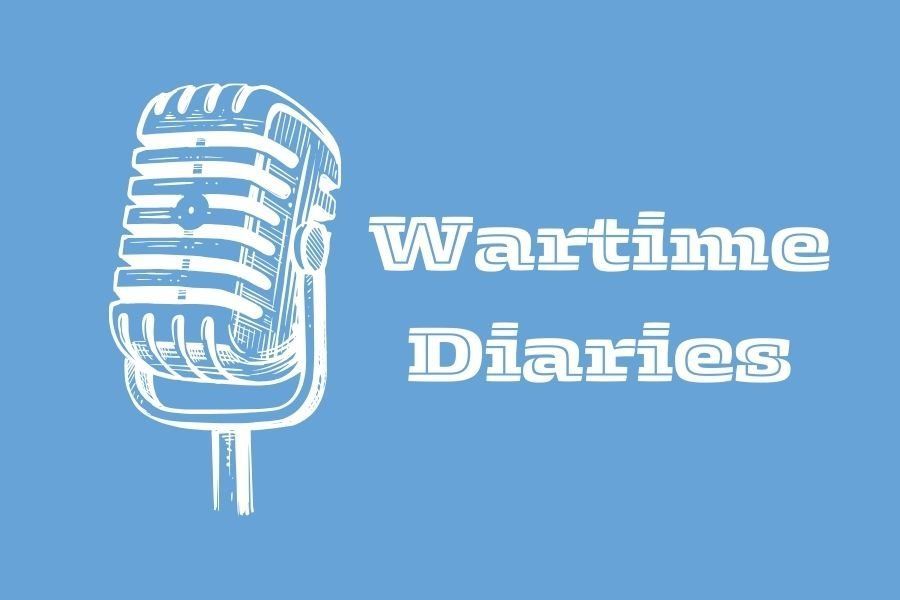
Early next week we will mark Yom HaShoah, Holocaust Remembrance Day. There are just about 160,000 Holocaust survivors still living in Israel, but they are rapidly vanishing. More than forty survivors die each day. And that means that the memory of the Holocaust, and the stories we tell and hear about the Holocaust are also changing. There are fewer and fewer first-hand testimonies, and more and more tales – like our episode today – of second generation survivors.
Prologue: Immediate Help
Mishy Harman talks to Tamara More, the (tired and overworked) volunteer CEO of the Association for Immediate Help for Holocaust Survivors.
Act TranscriptMishy Harman (narration): This is a busy of time of year for Tamara More.
Tamara More: More. M-O-R-E. Less is more.
Mishy Harman (narration): Tamara is the CEO of the Association for Immediate Help for Holocaust Survivors.
Tamara More: We are an organization that was established nine years ago in Israel, helping Holocaust survivors from morning to morning, weekend, holidays, every hour, every day of the year.
Mishy Harman (narration): And Tamara isn’t just saying that. When I came to meet her at the Association’s headquarters in Ramat Gan it was almost midnight. But she was in the middle of work. And this, I quickly figured out, was just a normal day at the office.
Tamara More: Well, it’s about twenty-four hours a day. Twenty-four-seven.
Mishy Harman (narration): The offices aren’t quite what you’d expect of an organization that deals with more than five thousand cases a year. There are no cubicles with filing cabinets or desktops. There’s no receptionist or conference room. Instead, basically every inch of free space is crammed with tall piles of canned tuna fish, or tomato paste, or bags of rice. When I asked her why there were literally hundreds of bottles of grape juice and boxes of matzahs, Tamara explained.
Tamara More: We had a huge huge dinner for four-hundred-and-fifty Holocaust survivors who are all alone in the world and had no place to celebrate Passover Eve. It was so difficult a task to do, and we barely slept for a month in order to make it happen for these survivors. And there were many many tears. But they were tears of joy, mainly.
Mishy Harman (narration): That was last week, but now she’s already knee-deep in her next project.
Tamara More: Yes… [Tamara sighs]. On top of everything else, a couple of days ago a few Holocaust survivors approached me and told me, secretly, that they have cancer, last stages of cancer. And they asked to celebrate their victory over the Nazis in a very special meal. They said it will be there last meal, because they are not expecting to live for long. And they ask it to be on this Sunday, which will be the eve of Holocaust Memorial Day in Israel. So I haven’t slept for the last few days as well, trying to make this happen. And it’s still in the making, it’s not final yet.
Mishy Harman (narration): As you can imagine, Tamara looks tired. Very tired. But she plows on. There’s a palpable sense of emergency in everything she does, as if she, and the Association she heads, are running out of time.
Tamara More: There are about forty Holocaust survivors that die each day. Twelve-hundred Holocaust survivors die each month in Israel. And these are the survivors who suffered the most. These are the older survivors who went through the Holocaust in the hardest way.
[Music comes up]
Act I: A Severe Case of Second Generation
Lizzie Doron is an Israeli author who was born in Tel Aviv in the early 1950s. Like many others of her generation, she grew up in the shadow of the horrors of the holocaust, and her childhood was filled with silence. Her questions about the family’s past were either left unanswered or else flat-out ignored. So, in a neighborhood where traumatic memories were relived on a nightly basis, Lizzie had to use her imagination to fill in the blanks of her own story. And, in her mind, she wasn’t alone. There was always someone there, looking out for her, looking at her. Maya Kosover unfolds an unusual saga which ends – decades after Lizzie left her mother’s home – with a shocking discovery.
Act TranscriptThe Hazelnuts: High above, on a hill,
Stood a castle tall, and still.
And in it lived, a family,
That had been there for eternity.
But nobody knows about this dynasty,
The only one left to tell is me…
Lizzie Doron: OK, so I’m Lizzie Doron, once upon a time I was Elizabeth. My mother want me to have a gentile name that I will have an option to leave the country and not to belong to the Jewish people. My last name was Ruja after my father but I never met my father.
Maya Kosover (narration): Lizzie was born in 1953. She was raised in a small, working-class neighborhood in South Tel Aviv.
Lizzie Doron: I grew up just with my mom as an only child. And I was surrounded by neighbors. They all came from “there,” which mean the Holocaust. It was a very warm, cozy and crazy neighborhood.
Maya Kosover (narration): More than a hundred families lived there. Most of them had fled the Nazis. They had known each other from the ghettos, from the woods, from the camps. And now, they were together again. Here, in Tel Aviv. So this neighborhood, you can imagine, wasn’t quite like other neighborhoods: It had its own rituals and traditions. At night, people would step out into the streets, let loose, and relive their traumatic memories.
Lizzie Doron: Every night I just looked through the window and it was around twelve o’clock that one of them ran in the streets shouting, “I am in Bergen-Belsen, I am in Bergen-Belsen.” There was another woman that when she did shower to her son, suddenly she felt that it’s a gas chamber. And she pushed him from the bathroom and she ran with him in the streets and the child was naked. So there were few neighbors who stood there with towels just to cover the small child.
The Hazelnuts:
מִיהוּ הַמְּיַלֵּל בָּרוּחַ
וּבְקוֹלוֹ הַשְּׁכוֹל?
מִיהוּ הַמּפַּלֵּל לָנוּחַ
וְאֵינוֹ יָכוֹל?
Maya Kosover (narration): Little Elizabeth would stand by the window, hidden by the curtains, and collect scattered bits of information.
Lizzie Doron: These were my bedtime stories.
Maya Kosover (narration): But in her own home, there was nothing but silence. She often tried to ask, to inquire, but her tight-lipped mother Helena wouldn’t cooperate.
Lizzie Doron: I asked her where she came from and it was just a short answer: “From the Holocaust.” When I ask her why aren’t you celebrating your birthday she used to answer, “because I’m a dead walking person.” When I wanted to know something about my father she said that anyhow he’s far away. And I didn’t know whether that meant that he left or died.
Maya Kosover (narration): Alongside her evasive answers, Helena had her own unique rituals.
Lizzie Doron: She used to go to the synagogue just during Yom Kippur.
Maya Kosover (narration): She would slip into the עזרת גברים, the men’s section, wearing a talit.
Lizzie Doron: And then instead of what is in the Jewish tradition to ask G-d to forgive us for our sin, she stood there and demand[ed] that G-d will ask her to forgive him and she mentioned all the names of the family that she lost during the Holocaust. Counting sixty-nine names.
Maya Kosover (narration): Once she was done, Helena would notify the other people in shul that now, and only now, could they go back to praying to their G-d.
Lizzie Doron: But not before taking out from her pocket a huge sandwich with schinken and cheese and when everybody was staring at her she said, “listen, I suffered enough. This is my celebration day, now I’m free to decide for my own and I never be hungry again.” And then she ate the sandwich and left the synagogue.
Maya Kosover (narration): At home Helena and Elizabeth were surrounded by secrets and question marks. Yet still, throughout her childhood, little Elizabeth had a strange feeling that… that she wasn’t alone. That someone was looking at her. Following her. She would occasionally see a face peering through her classroom window. Peeking in, and then immediately disappearing. And one day she was on her way to the center of town with a bunch of friends.
Lizzie Doron: We were on the bus, and I saw someone that is running behind the bus. And looking at me. And it was the same face that I saw from time to time at school through the window.
Maya Kosover (narration): Elizabeth told her friends she had a headache, and got off the bus. But actually she went on a manhunt looking for this boogey man of hers. She searched for hours, checking behind every tree, bush and building in the neighborhood. But she came up empty-handed. When she finally got home, she didn’t mention any of it to her mother. And, in general, as she grew up, Elizabeth’s relationship with her mom became more and more tense. When she was eighteen, a young soldier fell in love with her.
Lizzie Doron: He knocked on the door, and of course he came with the gun and with the uniform.
Maya Kosover (narration): Helena stared at the young suitor, and asked…
Lizzie Doron: “How many Arabs did you kill?” And she shut the door on his face. And I stood in the middle of the room, I looked at her, and I said, “but I’m in love, and he is the son of one of the chief generals in the Israeli Army.” And then she said, “that’s the reason I don’t want him to enter this house.” And then I said to myself, “OK, this is the time to take a suitcase and to leave.”
Maya Kosover (narration): Elizabeth ran away as far as she possibly could, all the way to a kibbutz on the Golan Heights. Her new home represented the proud, militaristic and machoistic Israel her European mother so despised. There, she worked the land and joined a גרעין נח”ל, a group that went into the army together. That’s where she got a new, snappier, name. Lizzie. Lizzie from Kibbutz Ramot.
Lizzie Doron: I was the one who was ready to work in the kitchen and to be with all those soldiers during the nights on the borders. I read just books about Israeli wars and Israeli heroes. I used to go with gun as if it’s my earrings or necklace. I felt that I’m the Israeli Hannah Senesh [Lizzie laughs].
Maya Kosover (narration): Three years later, when the Yom Kippur War broke out, Lizzie’s kibbutz fantasy was shattered. Seven of her closest friends were killed on the first day of the war. Shocked, she returned home to her mother.
Lizzie Doron: I enter my home after three years that I didn’t meet my mom. I opened the door. I ran to my room, I closed the door. She was clever enough not to ask anything.
Maya Kosover (narration): The trauma of losing so many friends led her onto a new path. Once again searching for a new identity, for new roots. She enrolled in the university, and met Danny. They fell in love and it quickly became serious.
Lizzie Doron: I called my mom, I ask her to behave well. She promised. And we went to visit her, and, as usual, when she opened the door, she looked at him and she had to ask him,“what was your job in the army?”
Maya Kosover (narration): Danny stood at the door, and sheepishly said that he had been a truck driver.
Lizzie Doron: And my mother had a wide smile on her face. And she looked at me and she said, “I think you found your husband.” I wanted to kill her. [Maya laughs].
Maya Kosover (narration): When Danny left, Lizzie asked her mom why she was so obsessed with what her boyfriends did in the army. For once, she got an answer.
Lizzie Doron: Killing somebody else change your soul and change your inner world and she dreamt that my husband will be a man that didn’t kill anyone. And he will be the one who will get from her permission to bring her a grandsons and daughters.
Maya Kosover (narration): A week later, Lizzie and Danny were engaged. They had two kids, a daughter and then a son. Lizzie went on to get a Masters degree. Life seemed stable. Calm. But in 1990, Helena had a sudden stroke. Lizzie rushed to the hospital.
Lizzie Doron: The head of the emergency room started to ask me questions. “How old is your mother?” And then I said, “I don’t know.” “Where she came from?” And I said, “I don’t know.”
Maya Kosover (narration): The doctor was surprised.
Lizzie Doron: Then he ask, “what she suffered from?” and I said, “nightmares.” And he said, “listen, you look as a serious person so I have to get the information to know how to treat her.”
Maya Kosover (narration): He asked if anyone in her family had died of an illness.
Lizzie Doron: And I said, “no, no. In my family everybody died healthy.” And then he was very confused and he said, “what’s that mean and what’s the reason for the death of your family?” and I said, “gas chambers.”
Maya Kosover (narration): The doctor asked Lizzie if she knew how her mom got the massive scar across her belly. Lizzie repeated what she had always been told: That it was from an appendicitis her mom had had in Auschwitz.
Lizzie Doron: And he looked at me and he said, “listen, Lizzie, are you saying in Auschwitz they did an appendix operation? Do you think about another alternative?” And I said, “such as?” And then he looked at me and asked “do you have any brothers, sisters?”
Maya Kosover (narration): The doctor knew the scar was from a c-section, but Lizzie told him she was an only child, and that she had been born a natural birth. He realized that she really didn’t know anything about her mom’s past. He called a psychiatrist into the room.
Lizzie Doron: And he whispered to the other doctor, “listen, we have a severe case of second generation.” And then I looked and I said, “I’m not a severe case of anything and I’m not second generation. I was born in Israel! And I’m an Israeli!”
Maya Kosover (narration): After seven long months in the hospital, Helena passed away.
The Hazelnuts: Enter “Miho Ha’Meyalel” in chorus.
מִיהוּ הַמְּיַלֵּל בָּרוּחַ
וּבְקוֹלוֹ הַשְּׁכוֹל?
זֶה שִׁיר-דֶּחִי, זֶה שִׁיר-בֶּכִי
שֶׁשָּׁרִים כֻּלָּם.
כָּךְ זוֹלֵג לוֹ עַל הַלֶּחִי
עֶצֶב הָעוֹלָם.
Maya Kosover (narration): A few years later Dana, Lizzie’s daughter, got an assignment from school to create a family tree. She asked a ton of questions about the family, but just like her mom before her, Lizzie didn’t have many answers. So Lizzie returned to her childhood neighborhood, in South Tel Aviv, and talked to some of the old neighbors. She sat down with an elderly woman who had been friendly with her mom.
Lizzie Doron: And I wanted her to tell me about my father. And she said, “I have in my album a picture in which I see your father is looking at you. It was a Purim celebration and he was beyond the trees.” And she showed me the picture.
Maya Kosover (narration): Lizzie recognized that photo. She had seen it many times before. In it, her giggly five-year-old self is standing in front of a tall hedge. She’s smiling a toothy smile, completely oblivious to the presence of a middle-aged man, hiding behind the hedge, looking at her. She had never noticed that guy beforehand. And now, she realized that that man was her father. The father she had never met.
Lizzie Doron: Because his face was hidden by the leaves, I never noticed it. When I did, I just knew that this was the man I had seen following me, looking into our classroom, and running after that bus.
Maya Kosover (narration): At the age of nearly fifty, Lizzie finally started putting together the pieces of the mysterious puzzle which was her father. He had survived the camps and arrived in Israel alone, battling tuberculosis. Back then, Helena was a nurse on a kibbutz, in charge of giving all the newcomers their medical examinations.
Lizzie Doron: And one day, this sick man came and told her that his last wish was to die as a kibbutz member. So… My mom kept his secret.
Maya Kosover (narration): When the kibbutz found out he was sick, they asked him to leave. At once. This reminded Helena of other selections she had witnessed, and she couldn’t remain silent.
Lizzie Doron: She wasn’t going to let this man die alone.
Maya Kosover (narration): So they both left the kibbutz, and moved in together, in Tel Aviv. Two years later, shortly after Helena became pregnant, his tuberculosis took a turn for the worse. He moved into a sanitarium, and the doctors said it was a matter of months. But he ended up living for eight more years. On better days, when he had enough strength to make it into Tel Aviv, he would watch his little girl from afar, like an invisible ghost, hiding behind hedges, bushes, or closed windows. Lizzie later found out that everyone in the neighborhood knew about him.
Lizzie Doron: Everyone but me.
Maya Kosover (narration): Dana’s family tree project turned into a book, Lizzie’s first. It was especially popular in Germany, and her life today is divided between Tel Aviv and Berlin. “I carry the pain of both lands,” she once told me. The final chapter of this saga came a few years ago, when a friend of Lizzie’s – a German, non-Jewish journalist – handed her a large manila envelope. Inside, she quickly discovered, were the answers to all those questions her mother had been silent about her entire life.
Lizzie Doron: After my mom survived Auschwitz, she was sent to a work camp. She nearly died there. And there was a doctor, a Nazi, who felt compassion for her, and saved her. After the war this doctor was sentenced to death, and my mom travelled to Poland, took the witness stand and said: “You know, the Jews say whoever saves a single life, it’s like he saved the entire world. So I ask you to spare this man, because he saved me.”
Maya Kosover (narration): The Nazi wasn’t ultimately executed. Helena had saved his life. And during her testimony, which Lizzie was now reading, Helena unfolded her entire story.
Lizzie Doron: She said: “My name is Helena Hochdorf, I came from Peshversk. I was in Plaszow, in Auschwitz, in Skerjetzki Kameyne, in Buchenwald. I lost my husband in the war. I had two sons, but I don’t know what happened to them.”
[Pause]
Lizzie Doron: My mom had always said I was her only daughter.
The Hazelnuts: Enter the song “Ten Li.”
Credits
Musical Credits
The original music commissioned for this episode was composed and performed by The Hazelnuts – Shira Z. Carmel, Yifeat Ziv and Ronnie Wagner. This story was made possible by the generosity of the JCC Manhattan.
Songs:
Mihu Hameyalel Ba Ruach (מיהו המיילל ברוח) –
Words by Yaakov Orland / traditional Russian song / arrangement by Yifeat Ziv.
Vocals: Shira Z. Carmel, Yifeat Ziv & Ronnie Wagner.
Ten Li (תן לי) –
Words, music & arrangement by Yifeat Ziv.
Vocals: Shira Z. Carmel, Yifeat Ziv & Sapir Rosenblatt

 Wartime Diaries
Wartime Diaries

